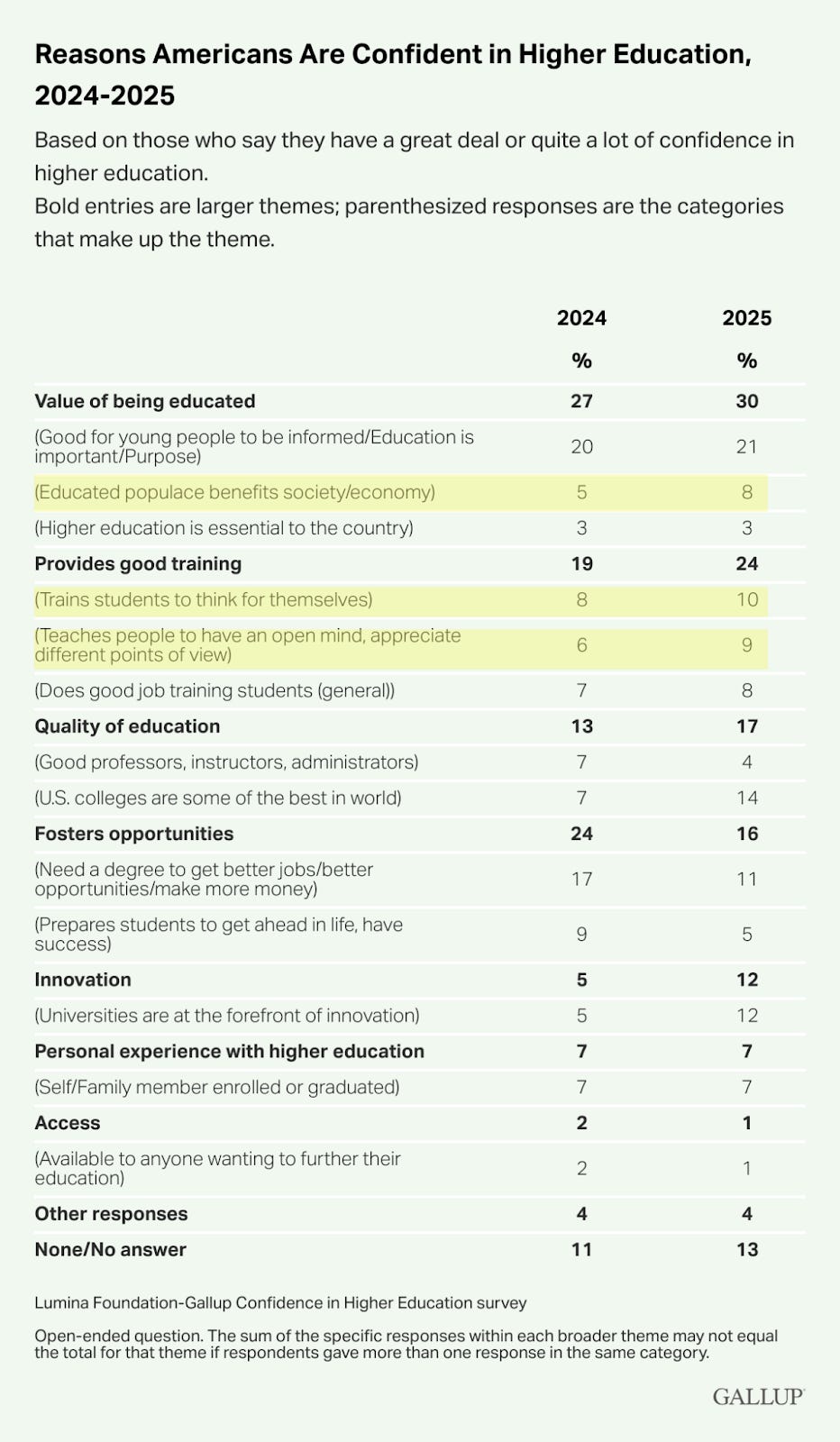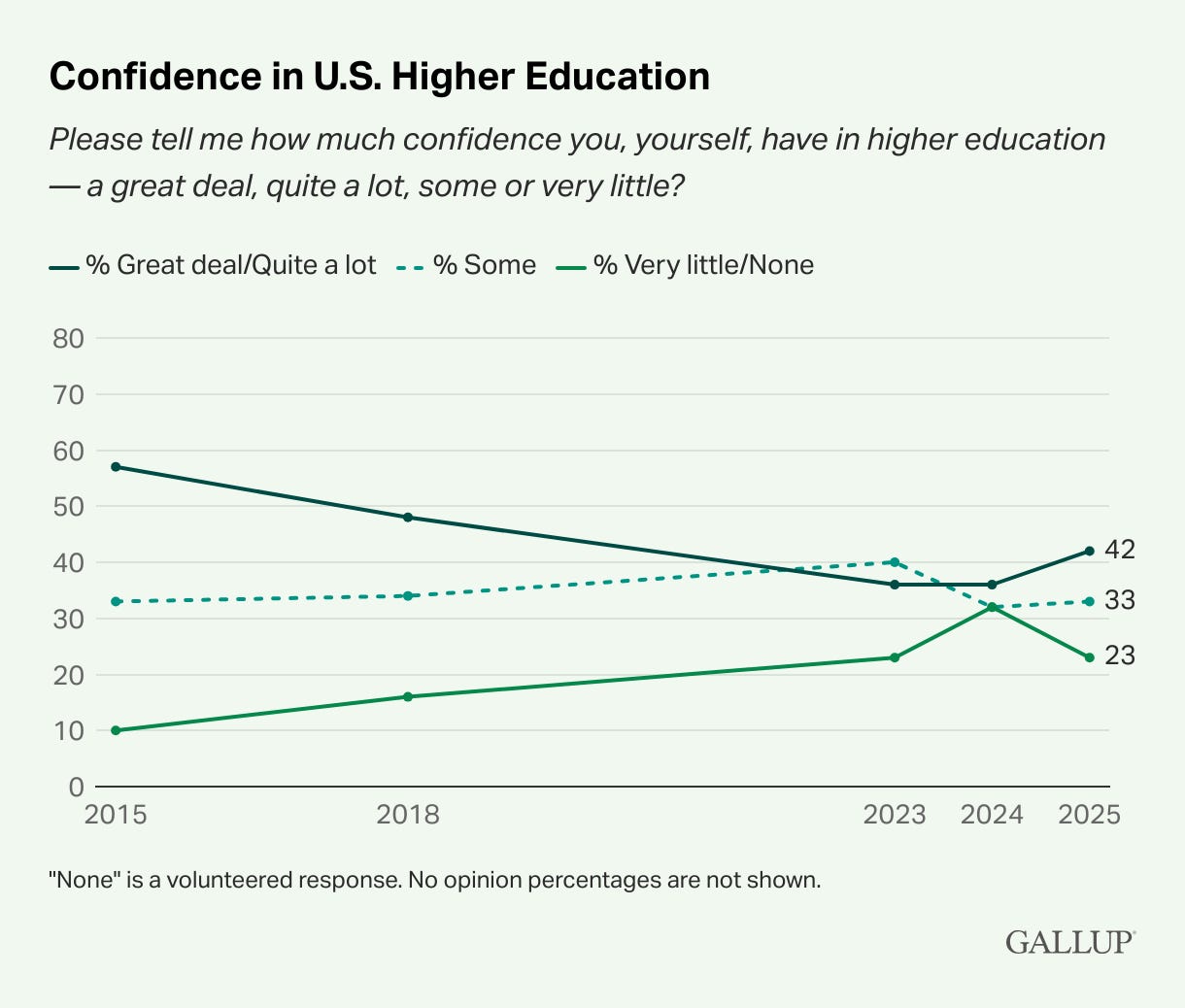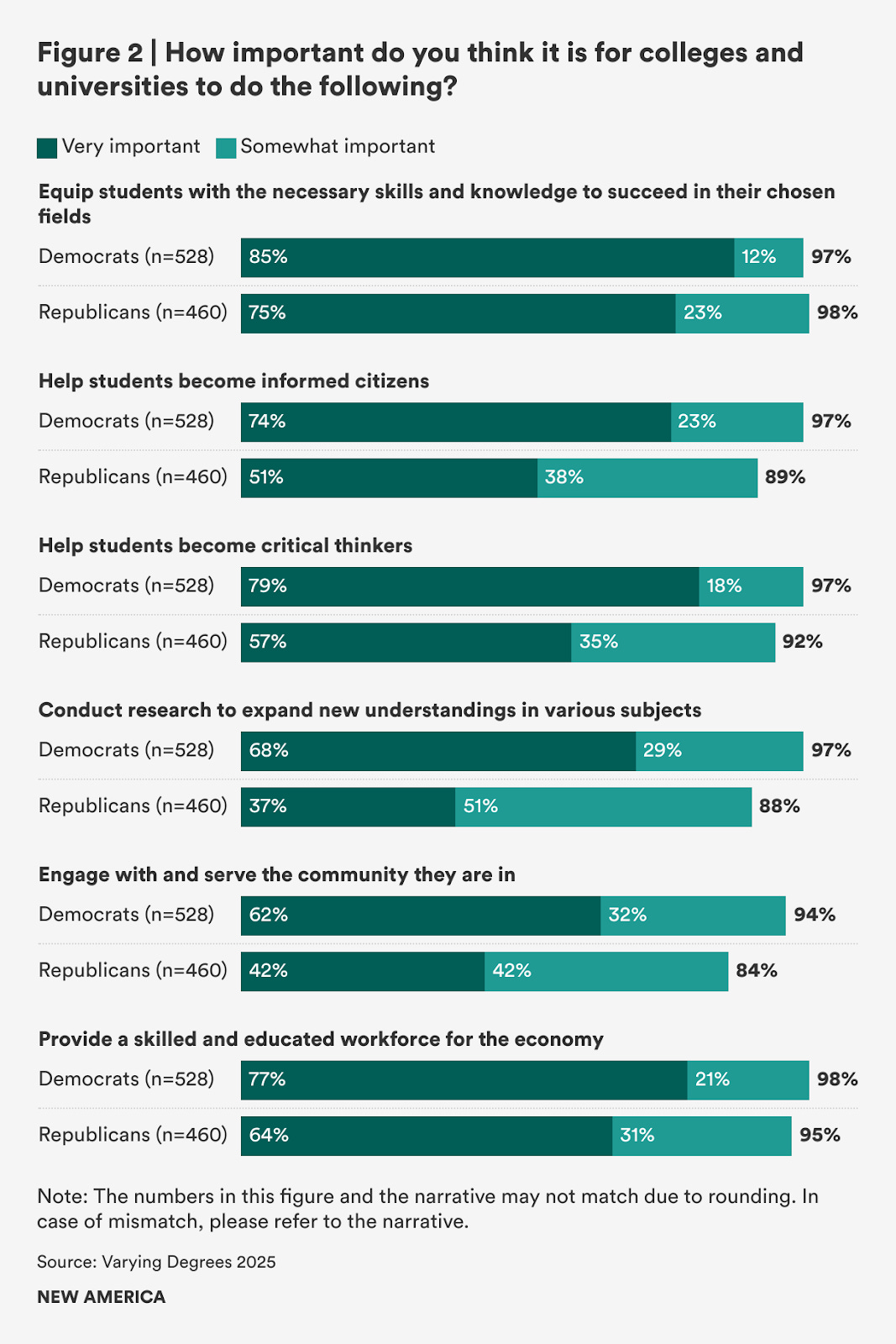Public Perception of U.S. Higher Ed Is Turning Around
Politicization is out, education is in.
For most of the past decade, public confidence in higher education has been steadily declining. In 2024, the annual Gallup poll on the subject showed public sentiments had hit an all-time low, with only 36% of Americans expressing confidence in higher ed. The partisan gap has been especially stark, with confidence levels among Democrats and Republicans diverging by over 30 percentage points — a reflection of the ideological tensions surrounding our colleges and universities.
But this year, for the first time in a decade, the numbers finally turned around. Of Americans polled in the survey last month, 42% said they have either “quite a lot” or a “great deal” of confidence in higher ed — up six percentage points from the previous year. Even confidence among Republicans saw a substantial jump, from 20% in 2024 to 26% in 2025.
A follow-up web survey of U.S. adults conducted in June by Lumina Foundation-Gallup offers some clues as to why confidence is up this year. Among those who now express confidence in higher education, several key beliefs about American higher ed stand out for their increases since last year:
“Teaches people to have an open mind, appreciate different points of view” (+3%)
“Educated populace benefits society/economy” (+3%)
“Trains students to think for themselves” (+2%)

Meanwhile, among those who lack confidence in higher ed, one reason consistently tops the list: perceived politicization.
When asked what colleges and universities can do to regain public trust, respondents were clear. The third most popular recommendation (after career preparation and affordability) were actions lumped into the category ‘political agenda.’ This includes calls for less partisan activism on campus, greater protection for free expression, and a retreat from overly ideological Diversity, Equity, and Inclusion (DEI) initiatives.
These Lumina-Gallup results suggest that Americans want their universities to be places of learning, not political stomping grounds for activists. Notably, new polling from New America released last week also shows convergence among Democrats and Republicans on what they think colleges and universities should be doing. Topping the list: educating students in their field, being informed citizens, becoming critical thinkers, and conducting research to expand understanding.
For at least the past five years, politics and protest on campus have been on front pages of news sites across the U.S. We’ve been witness to increasing politicization of research and teaching where topics are seen as off limits, disruption of university operations for political purposes, and a general ‘awokening’ that has spilled off campus into the greater public. Then, with the election of Trump came swift and sharp retaliation against universities for the disruptions of recent years.
Although it’s hard to say for sure, the recent public polling data from Lumina-Gallup and from New America seems to suggest that Americans are feeling that our colleges and universities are doing pretty okay, actually. Improvements are needed, but damage and destruction are unnecessary.
Take for example the huge jumps on two “reasons Americans are confident in higher ed” from the Lumina-Gallup poll: U.S. colleges are some of the best in the world (+7 points) and universities are at the forefront of innovation (+7 points). The New America poll similarly shows that 42% of Americans think universities are doing “fine” and 54% think universities are having a positive impact on the country – though predictably, for the latter, Republicans are less likely (39%) to think so than Democrats (75%).
The partisan divide of public perception of higher ed remains for most areas of interest, but a large enough segment of the samples across these polls and surveys indicate a change in tune from the past ten years: Higher education is valuable and its point is to prepare young folks for meaningful careers and help shape them as thinkers. It’s not a place for political activism in classrooms, research, or disciplines.
Heterodox Academy has been taking steps to recenter universities on the core mission of knowledge-seeking for a decade. We called out the political bias that was eroding research and teaching quality in the social sciences when we were founded 10 years ago. We’ve grown our membership to critical masses on dozens of campuses across North America to enact lasting, sustainable changes to get politics out of policies and scholarly norms to focus instead on knowledge-generation. And last year, we spearheaded the wave of institutional neutrality policy adoptions to get universities out of the business of weighing in on social issues.
Today, we’re calling on universities — and our members — to keep the good work coming. Our Open Inquiry U Reform Agenda outlines 12 practical commitments, policies, and practices universities can enact to create campuses where open inquiry and intellectual freedom thrive.
If you’re a college president or senior leader, here’s what you can do to lay the foundations for open inquiry on your campus this fall:
Commit to institutional neutrality on public or contested issues unrelated to the university’s operations.
Commit to the Chicago Principles or a robust free exchange of ideas on campus.
Enshrine knowledge-seeking as the university’s core, non-negotiable purpose.
Eliminate political litmus tests from faculty hiring, review, and promotion.
If you’re a faculty or staff member at a college or university, here’s what you can do right now:
Become a member of Heterodox Academy. If you already are one, recruit a colleague to also join.
Join your local Campus Community if you’re on one of 74 campuses where we’re active or launch a Campus Community at your own institution this fall.
Champion HxA’s Open Inquiry U Agenda to your colleagues, across your discipline, and throughout your network.
As we’ve seen, public trust is fragile. Let’s make sure this year’s data is the start of a new upward trend rather than an anomaly.
Let’s keep the momentum going.




